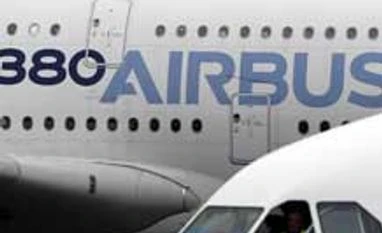“Now, flights of A380 to India will be allowed to airports that are equipped to handle these,” the ministry said in a statement. “The operation of A380s will help airports generate more revenue, give more comfortable and luxurious travel to passengers, liberalise the civil aviation milieu in India and boost the image of Indian civil aviation in the international market.”
Earlier, the government had refused to allow A380 operations, saying these massive aircraft would see foreign airlines snatch a large chunk of international traffic. The decision to lift the ban followed consultations between the Directorate General of Civil Aviation (DGCA), Air India and the Airports Authority of India.
More From This Section
The operations of the A380s will be subject to overall traffic entitlements in the air service agreements with different countries. A ministry official said for cases in which bilateral air traffic rights weren’t expressed in terms of seats per week, entitlements would be rationalised and converted into seats/week before allowing A380 operations from these countries.
Air service agreements, which specifically prohibit A380 operations to India, will have to be amended.
Amber Dubey, partner and head (aerospace and defence) at global consultancy KPMG, said, “The A380s will help bring down fares and improve the cost competitiveness of the Indian tourism sector. They will improve the efficiency and capacity utilization at Indian airports. This decision will also allow India to get more market access in UAE, Germany and Singapore for Indian goods and services. All in all, a great move that will show benefits in the coming summer season.”
The A380 can carry up to 850 passengers in an all-economy configuration and 550-600 passengers in three-class configuration allowing airlines to transport more travellers without adding flights. Airbus has already delivered 120 A380s and has an added 262 aircraft on order.
Nine of the 10 airlines that currently fly the A380 have scheduled flights into India. Lufthansa, Emirates and Singapore Airlines said they will review plans for A380 operations to India. A spokesperson at Lufthansa said, "India is one of Lufthansa’s most important intercontinental markets and the only large aviation market that had restricted the A380. Lufthansa currently already operates the A380 to the USA, China, Japan, Singapore and South Africa. India will be very high on our list for future A380 operations.” Lufthansa currently flies the Boeing 747-8 into India in a three-class configuration.
David Lau, general manager (India), Singapore Airlines, said, "The clearance to deploy A380s on Indian routes is favourable news to the Indian aviation industry. Singapore Airlines will evaluate the commercial viability of this recent development based on available traffic rights and resources."
An Emirates spokesperson said, “Any decision to deploy an A380 on our network is dependent on passenger demand on that particular route as well as the ability of airports to handle the aircraft… We will be reviewing our existing operations, and look forward to serving Indian travellers with our flagship aircraft in the near future.”
Foreign carriers had been seeking permission to operate A380s to India since 2008-09. Earlier, the government had refused to allow A-380s maintaining that these massive aircraft would see foreign airlines take away a large chunk of international traffic and therefore could be detrimental to the interests of Indian carriers. A review of this decision came after the DGCA conducted a study showed that the operations of the A-380 would not adversely affect operations of Indian carriers.
A spokesperson at Delhi International Airport Limited (DIAL) said, “Delhi International Airport (P) Limited welcomes the Ministry of Civil Aviation’s decision to permit A380 commercial operations…Indira Gandhi International Airport (IGIA) is one of the few airports in India equipped to handle A380 flight operations backed by our state-of-the art infrastructure, both in the terms of passenger terminal facilities and aircraft operations airside facilities.” IGI Airport is immediately capable and duly equipped to handle up to 12 A380 aircraft simultaneously and in full compliance with ICAO and DGCA mandates. Parking bays are equipped with electrical ground power and pre-conditioned air facilities to support A380 movements. T3 terminal facilities such as check-in capacity, boarding gate capacity and baggage handling system capacity have all been designed to provide for simultaneous A380 operations.
Larger aircraft like the A380 combined with higher load factors make the most efficient use of limited airport slots and contribute to rising passenger numbers without additional flights. The A-380s have already made debut flights to Delhi, Mumbai and at the airshows in Hyderabad.
“The A380 is the world’s most fuel efficient aircraft in service with the lowest operating costs per seat and the highest revenue generating potential which benefits the airlines and the travelling public. For the Indian flying public, the A380 offers the world’s most comfortable flying experience,” said Kiran Rao, executive vice-president (strategy and marketing).
)